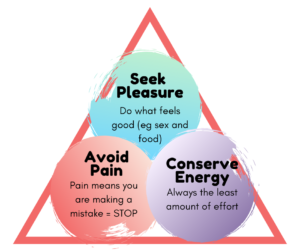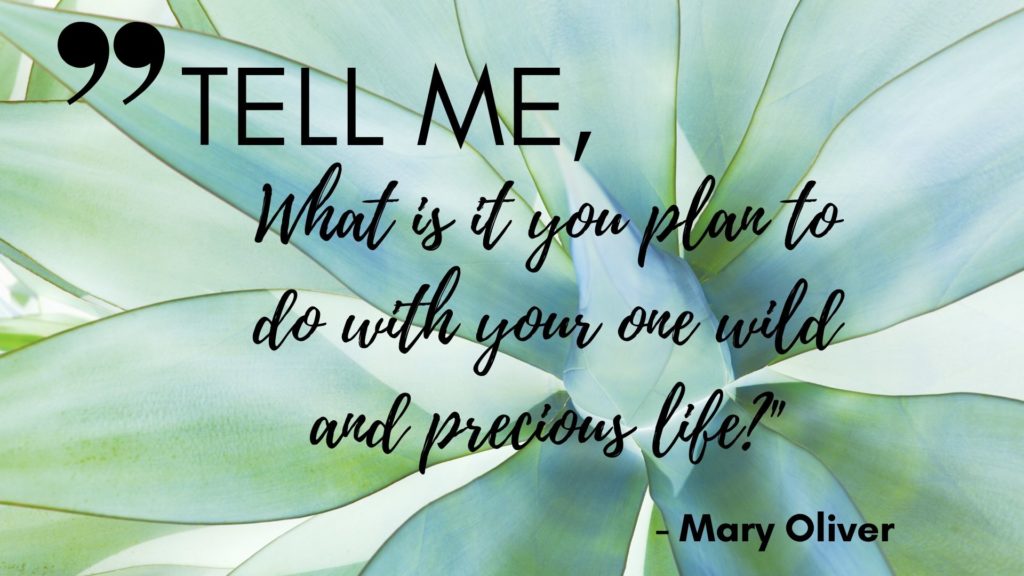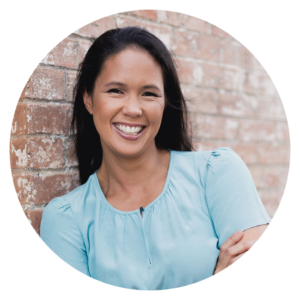Are you living your life on default or on purpose?
Most of us want to feel like we have some control over our life and our future. We understand that we get to choose and decide what we will do, but few of us are actually setting goals and crafting a plan to get where we want to go.
IN THE NAME OF WANTING TO PLAN BETTER, we might tell ourselves, “I can’t predict the future. I don’t know what’s going to happen. I don’t know what we’re having for dinner tonight. I need to wait and see.” And so we wait to see what happens. Well, what happens is that we don’t have a plan, which sets us up for going back to our default decision making process. 👎
Our default decision making process is usually what is creating the problem we are trying to solve in the first place.
“Planning is bringing our future into the present, so that you can do something about it now.” – Alan Lakein
Planning is uncomfortable, because it requires you to make decisions. Lots of small decisions. But you know what’s more uncomfortable? Indecision. Let’s take a simple example of boldly setting out to shop at Wal-Mart.
You aren’t sure what you are making for dinner tonight or tomorrow night. You are out of several important items. YOU. MUST. GO. TO. WALMART.
You haven’t “had time” to decide what you are making. You are walking into the store, and there are so many people. You think, “Head to the back and make your way forward.” The challenge is to find an idea that you AND your family can eat. Your food plan doesn’t allow a lot of the go-to dishes you’ve made in the past.
Tacos? You’re not eating chips or tortillas. Spaghetti? No pasta on your plan and you don’t have time for roasting spaghetti squash. Not enough time for roasting chicken or cooking a ham. You think, “I’ll just make my favorite 7 layer salad.” Meanwhile, you’ve been considering what cereal the kids want, what you need on the other side of the store, and now you’re all the way up to the bread isle. You go back to get the bacon. You come back to the front and pick up the veggies. Oh–you need cheese (which you’d rather pick up at Costco because it’s so much cheaper). Back to the end of the store you go. You also need frozen peas, so you stop in the frozen section.
On your way out, you remember you are completely out of bandaids and kids’ toothpaste. You think, forget it! I’m not going back in there! So you’ve pretty much committed to a do-over tomorrow. Especially since you have no idea what you’re making for tomorrow’s dinner, right? (BTW: this is just ONE REASON why I love fasting!)
This kind of experience is rather exhausting for most of us. We avoid it, and that’s why we might opt to stop and get Costco pizza or Jimmy John’s subs on the way home instead.
We resort to making decisions in the moment. And this is precisely the thing you DO NOT want to do when you are working toward a goal.
Decisions in the moment vs. Decisions ahead of time
You have 2 parts of your brain:
- Primitive brain: This is your lower brain that has evolved to help us survive. It is only concerned with the moment in time, because it makes all its decisions based on the motivational triad: 3 priorities that keep our immediate interest front and center:
Take a moment to appreciate that no where in the motivational triad is your long-term well-being an important consideration. It’s all about instant gratification.
- Your human brain: This is the prefrontal cortex, or your executive brain. It is the part of your brain that is concerned with your overall well-being and your future. It weighs the pros and the cons and makes a decision that is in your future best interest. It delays instant gratification for a greater gain.
This is helpful to understand because you do NOT want your primitive brain to be calling the shots. It will always make decisions to seek pleasure, avoid discomfort, and conserve energy. It only cares about this moment in time, not how you will feel about your decision tomorrow.
This is why you MUST make decisions about what you will eat ahead of time. I recommend you make them first thing in the morning, or the night before. When you do it this way, you are considering what is best for your future self and what will get you to your goal. And you are not grappling with temptations to give in to your primitive brain’s agenda.
Decisions ahead of time = freedom and ease
The best part of making a plan for the day is that it shuts down all the mind drama that happens when we are trying to make the “best” decision in the moment. Most of us are faced with decisions over and over in the day about what and when we will eat.
One of MANY examples I can think of: every month, my workplace has a birthday cake for anyone whose birthday falls in that month. If I haven’t made my plan for the day already, I’m open to making decisions going forward. I have to make a decision of whether or not to eat the cake when:
- The email drops into my box about the cake. 🤨
- I see the cake as I walk past the coffee nook each time I go to the bathroom. 😬
- I see someone eating the cake as they walk down the hallway. 😒
- Someone says to me, “Hey, did you know there’s birthday cake in the coffee nook?” 🙄
- Someone brings me a piece of cake to be kind and thoughtful. 🤬
But what if I already made my decision? I made it that morning or the night before. I wrote it down and committed to it.
There is so much freedom and ease in my day when I have made my decisions ahead of time. It shuts down all the mind drama.
I can watch my primitive brain trying to hijack the situation and understand why it makes its pleas and arguments. Just like when a toddler throws a fit because you won’t let him have a Popsicle for breakfast. You say , “No, we’re not doing that” and move on.
Food journaling eliminates unconscious eating
Another major advantage to creating a plan and following it is that it holds you accountable. I require that my clients journal everything that passes through their lips. Every bite. Every lick.
Why? Because it requires you to make a decision. Instead of eating without a thought even surfacing in your mind, you have to create awareness and take responsibility for each and every thing you are putting into your mouth.
Do not underestimate the power of this. If you like proof, there is plenty of published research on this topic. Just food journaling as the sole intervention can result in weight loss.
It’s ideal to journal as you go through the day. By the end of the day, recall gets fuzzy. Plus, if you mis-stepped, real-time journaling allows you to assess what happened with so much more clarity of what was going on in your brain when you went off your plan.
There are many digital applications that make this easy and convenient. Although I have used MyFitnessPal in the past, my personal preference is to keep a written journal.
How to Plan
Do it first thing in the morning or the night before.
WRITE IT DOWN.
Be specific: what you will eat and at what time. Sometimes, I put a qualifier in there as well (e.g., “IF I’m hungry, I will eat…”)
Make your plan USABLE, not WISHFUL. Your plan should be something you feel you can follow with confidence. On a scale of 1 to 10 of how confident you feel that you can follow it, with a 10 being 100% confident, I want it to be an 8 or better.
When you go back to journal your food, if you have gone off your plan, you need to learn from it. We do this by creating a strategy for how to handle that obstacle the next time it comes up. Write this down along with the food journal. This is the plan for how you will avoid failure the next time this same obstacle presents itself, which is highly likely!
Planning and executing is where transformation happens
It happens in the day to day decisions and actions toward your goal. It happens when you are learning, growing, and uncomfortable, not when you are having fun.
How do you feel about planning? Food journaling? This is a clue. If you feel inspired by it, open to it, or confident in it, you know you will do it. If you feel resistant or closed to it, you know you will not do it.
Why? Because humans avoid negative emotion.
The best news is: our feelings are caused by our thoughts. If you wish you could plan because you think it could help you, but you feel resistance to it, we need to look at your thoughts about it. What are you thinking that is causing you to feel resistance? This is the best news because our thoughts are optional. Once you can see which thought you have that creates resistance, you can see what is driving you to NOT plan and not move you toward your goal. And then you can choose a different thought that creates a different result.
This is what I do when I coach people. You know those A-HA! moments? When you can see with 100% clarity what is wrong? That is what coaching does. It vanquishes confusion and overwhelm and makes clear the path to success by showing you how to get out of your own way.
I can help you get what you want. Reach out here to schedule a free consult with me now:




